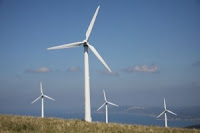
Use of renewable energy climbed in United States and across the globe last year, producing about 16% of the world's power, while clean-energy manufacturing centers are shifting from Europe to Asia, according to a new report.
Expansion of clean energy was strong in the United States. The latest REN 21 renewables global status report estimated "renewable energy accounted for about 10.9% of domestic primary energy production (compared with nuclear’s 11.3%), an increase of 5.6% from 2009. "
But even that robust gain didn't come close to some other nations. China added an estimated 29 gigawatts of grid-connected renewable capacity, for a total of 263 - a boost of 12% in one year. Renewables accounted for about 26% of China’s total installed electric capacity and 18% of generation.
The report notes that renewables such as biomass, wind and solar accounted for 11% of Germany's total energy consumption. Meanwhile, wind power made strong advances everywhere, accounting for 22% of electricity demand in Denmark, 21% in Portugal, 15.4% in Spain and 10.1% in Ireland.
Wind turbines proliferated worldwide in 2010, tripling in capacity from five years earlier. At least 52 nations increased wind production, and 83 countries use it on a commercial basis.
China led the world in new installations with an estimated 29 gigawatts, up 12% in one year. The U.S. ramped up 5 gigawatts, or 15%, with total wind capacity at year-end able to power 10 million houses. Wind energy played prominent roles in Iowa and Texas, where it supplied 15% and 7.8% of electrical needs respectively, but wind energy has a presence in 38 states, including California.
The report contains way too much information for one blog. It breaks down capacity and production figures for most types of renewable energy (Did you know the U.S. leads the world in biomass generation and that ocean energy is gaining interest?); tracks policy and investment trends; and notes opportunities in rural and developing nations.
The study, however, does not give forecasts or predict trends. Whether the expansion continues in 2012 and beyond remains to be seen. Germany is taking steps to slow things down, Spain is considering modifications in its solar program and China's economy might be built on sand, but this story in the Vancouver Sun suggests green-power systems could become the world's primary energy source within two decades.
And then there is the influence of election-time politics in the United States, the high-profile implosion of Solyndra and the effects of increased competition. The two GOP front-runners can't be described as strong environmentalists, however it is hard to justify being against energy efficiency. Saving money, cutting costs and prudent stewardship are pretty hard to campaign against.
It will be an interesting year.
No comments:
Post a Comment